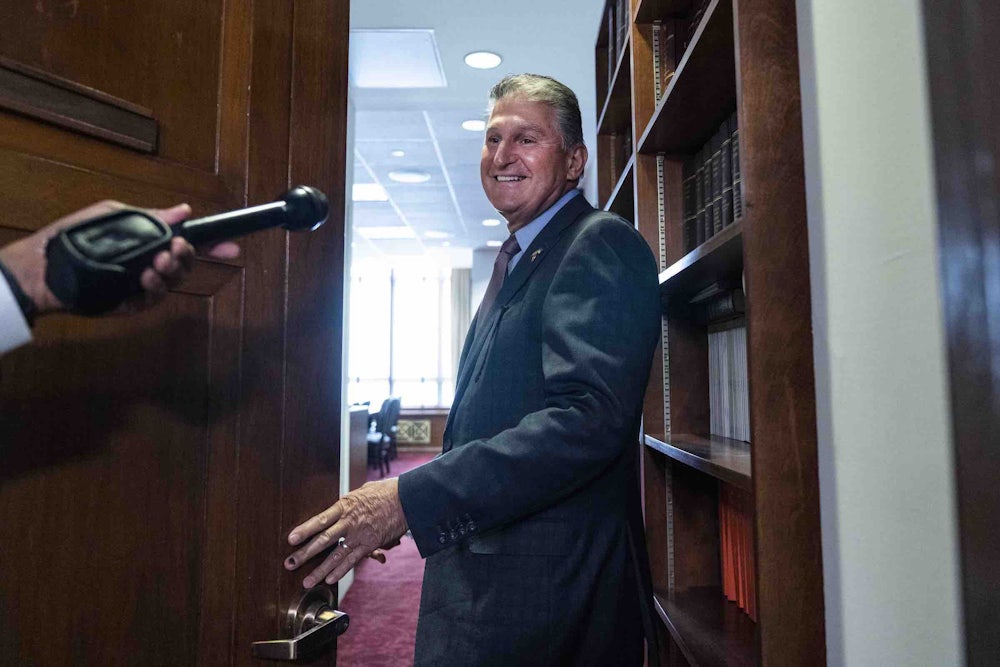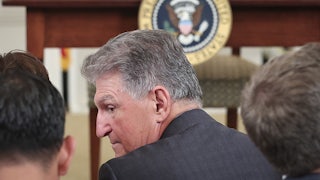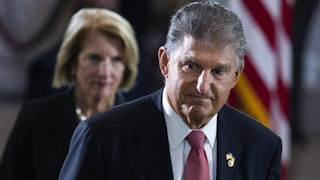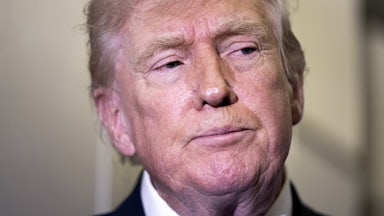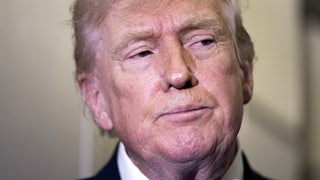I claim no insight into the mind of Senator Joe Manchin of West Virginia, the Democrats’ ever-elusive fiftieth vote. Manchin has a habit of saying he’s amenable to compromise and then, as negotiations near their end, finding some reason to scuttle the deal. I don’t recall encountering this tactic before. The nearest equivalent is when a legislator pretends he or she is open to compromise, wrings some concessions, then votes against final passage. That isn’t very nice, but at least it achieves a strategic goal: Concessions have been won.
Manchin’s variation is to back out before the final vote, killing the bill and losing whatever concessions he secured. The same accusations of bad faith ensue but with nothing to show for them. It’s a tactic designed to drive a game theorist batty.
Because Manchin’s coquetry leads nowhere, I’ve learned to pay it little heed. But I must make an exception for Manchin’s reversal on the global minimum corporate tax, because it makes even less sense than usual.
Treasury Secretary Janet Yellen has spent much of her time in office shepherding a 15 percent global minimum tax on corporate income proposed by the Organization for Economic Cooperation and Development. Finance ministers for the Group of Seven nations agreed to it last summer, and last October they were joined by leaders from 136 countries representing more than 90 percent of global gross domestic product. For years, the world’s nations have been trapped in a competition to lure businesses by lowering corporate taxes. The United States entered this limbo contest in 2017 by reducing corporate taxes from a top marginal rate of 35 percent to a uniform rate of 21 percent. Now the OECD proposal offers a way out. Even the Cayman Islands, which has no corporate income tax at all, is ready to sign.
The U.S. loses more than most from the status quo because corporate tax revenue has fallen to less than half its historic average since 1930 and because, as a share of GDP, the U.S. collects less revenue from corporate income, profits, and capital gains than any other OECD country except Latvia. There are many reasons for that, but one big one is that corporate investment gravitates to low-tax overseas jurisdictions. In announcing the agreement, Yellen rightly called it “a once-in-a-generation accomplishment for economic diplomacy.”
Manchin has never supported President Joe Biden’s proposed increase in the corporate income tax rate from 21 percent to 28 percent, but until recently he did support an increase to 25 percent. He said lowering Biden’s increase to 25 percent was necessary to keep U.S. corporate taxes competitive. (The economy was doing just fine in 2017 when the top rate was 35 percent, but never mind.)
Manchin now says he will support no corporate tax increase pending next month’s report on July’s inflation figures. The consumer price index for July is expected to be lower than June’s 9.1 percent, but don’t hold your breath for Manchin to change his mind; he also says he wants to watch what the Fed does, and we know what the Fed is going to do. It’s going to continue raising interest rates to curb the inflation that Manchin makes such a great show of fretting about.
If Manchin wants U.S. corporate taxes to be competitive, he should favor the global minimum corporate tax, because that’s its purpose. It makes U.S. corporate taxes more competitive by raising taxes in other countries. Its only effect on corporate taxation here is to raise a tax on some foreign earnings that was created in 2017 from a maximum 13 percent to a flat 15 percent, and to collect that revenue on a country-by-country basis. Other nations would do the same.
Manchin used to be fine with that. Here’s what he said last October 27:
We’ve all agreed on a 15 percent corporate [minimum] tax. People in the stratosphere, rather than trying to penalize them, we ought to be pleased that this country’s able to produce the wealth. But with that, there’s a patriotic duty that you should be paying something to this great country to give you the protection and the support and the opportunities. That’s called a patriot—a patriotic tax would be nothing that we should be scorned about. It doesn’t harm anybody.
What a difference 10 months make. Here is what Manchin said this past Friday to a West Virginia radio interviewer:
When we saw [an inflation rate of] 9.1 percent, that was an alarming figure to me. Higher than anything since from 40-plus years. So I said, “Oh my goodness, let’s wait now. This is a whole new page.” … I’m trying to get all the input I can by professionals that anything we’ve talked about, in taxes, does not affect the economy of the United States of America or to the people of the United States of America. I want people to pay their fair share. I think corporations should pay their fair share. But I’ve got to be careful that corporations aren’t basically stymied to where they won’t invest, they won’t hire, they start laying off, I want to make sure none of that can happen.
If Manchin is worried about inflation, he should favor tax increases, because (as I explained last month) tax increases are a textbook example of something you do when you want to curb inflation. If Manchin is worried that corporations are too fragile to pay more in taxes, please somebody tell him that corporate profits are at a historic high. Granted, they dipped 2.2 percent in January-March. But that was after rising 25 percent in 2021.
Here’s what Manchin said last Friday about the 15 percent minimum corporate tax:
A 15 percent minimum. They wanted to do 15 percent starting with what we call the OECD, overseas, all of our international competitors. Right, but you know what, the rest of the countries aren’t following suit, and are having a heck of a time, and I said we’re not going to go down that path overseas right now, because the rest of the countries won’t follow, and we’ll put all of our international companies in jeopardy, which harm[s] the American economy. Can’t do that. So we took that off the table.
Manchin’s got that backward. If the U.S., with the biggest economy in the world, doesn’t enact the 15 percent minimum, that will discourage other signatories to the OECD agreement from doing so. The main stumbling block at the moment is Hungary. Hungary is blocking ratification by the European Union because it has very low corporate taxes and because Prime Minister Viktor Orbán is a belligerent proto-fascist whose government is working with congressional Republicans here to kill the OECD plan.
But the Biden administration has some leverage against Hungary. Last week, it announced that it will terminate its four-decade tax treaty with the country, which has lately been a much better deal for Hungary than for the U.S.
Manchin also seems to object now to raising the U.S. tax on foreign earnings that I mentioned earlier from a maximum 13 percent to 15 percent. The tax, known as GILTI (for “Global Intangible Low Tax Income”) targets foreign returns that exceed 10 percent. It was enacted under President Donald Trump to discourage companies from moving facilities to low-tax jurisdictions offshore. It didn’t work. Offshoring under Trump continued at about the same rate as it was during the last four years of President Barack Obama’s administration.
Probably Manchin has been talking to Republicans. Republicans fervently oppose altering GILTI to conform to the OECD’s global minimum corporate tax. Senator Mike Crapo and Representative Kevin Brady, the top Republicans on the Senate Finance Committee and the House Ways and Means Committee, laid out their objections in a September 2021 letter to Senator Ron Wyden and Representative Richard Neal, the Democratic chairmen of those committees. The message boiled down to You’re not the boss of me. “The administration has represented to our global partners that it can unilaterally compel changes in tax law,” they wrote, “a significant infringement on congressional authority.” This is nonsense. Our global partners are well aware that any change in U.S. tax law must be approved by Congress.
Over the long term, Manchin’s objections to the global minimum corporate tax won’t likely prevail, even if the Republicans retake Congress in November. That’s because of an enforcement rule built into the OECD agreement. Countries that adopt the global minimum tax will be able to impose “top-up taxes” on companies that operate in their jurisdiction if the company’s effective tax rate falls below 15 percent in another country. “If a country does not enact the … minimum tax on its resident multinationals,” explained Lily Batchelder, assistant treasury secretary for tax policy, in an April speech, “other countries will apply the minimum tax to those multinationals via their subsidiaries and soak up all the revenue that that the non-implementing country could have collected.… No longer will it pay off to route earnings through daisy chains of subsidiaries in search of the lowest tax rates.”
U.S. corporations operating in tax havens will have to pay a 15 percent corporate tax to somebody, whether the U.S. adopts the global minimum tax or not. If Congress refuses to pass the measure, other countries will make up the difference and keep the extra revenue for themselves. Eventually, that should prompt Congress to repatriate that revenue by enacting the global minimum tax. If you think taxation without representation is tyranny, wait till you take a gander at taxation without revenue.
Manchin should worry less about what Mike Crapo and Kevin Brady think and more about what West Virginia voters think. In a poll last fall of registered voters in the state, 52 percent said they would be more likely to support a candidate who favored raising the corporate income tax not to 25 percent but all the way to 28 percent. Among Republicans, a 44 percent plurality said they’d prefer 28 percent. Conceivably, given that there was an error in the question, these voters would prefer even higher corporate taxes. The question said 28 percent was the “previous” rate, when the previous top rate was actually 35 percent.
West Virginia is a conservative state with a senior senator who’s a Democrat. Manchin’s obliged to remember that at all times. But if he thinks his constituents want corporations to avoid taxes by sheltering profits in tax havens, he is seriously out of touch.
